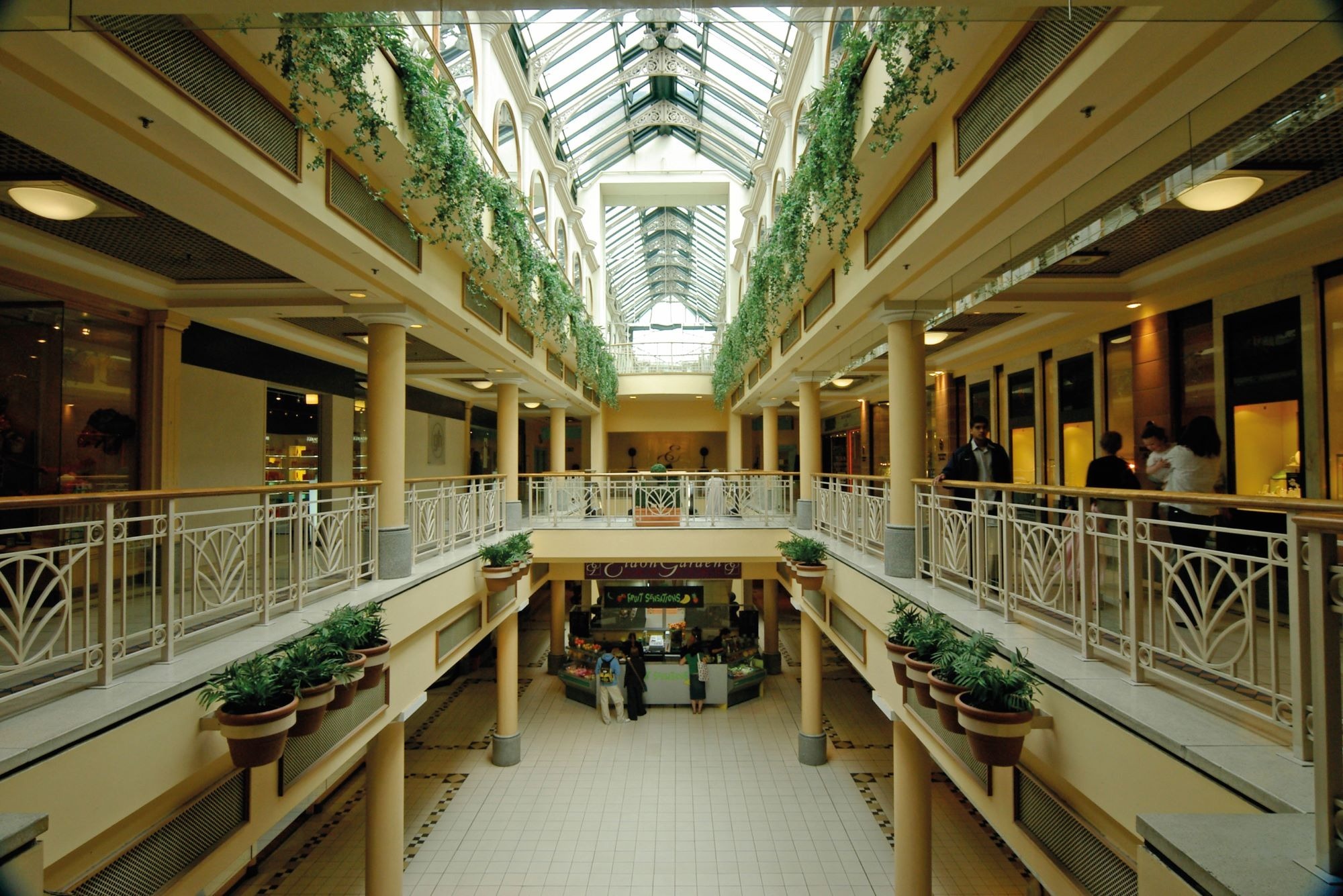All over Britain, shopping centres are closing down. Can these retail paradises be replaced by new public spaces?

On my lunchbreak I often find myself wandering through Eldon Garden, a shopping mall in central Newcastle. It’s hard to imagine a more forlorn archetype of the modern British city. Once a shining embodiment of the Thatcherite dream that post-industrial malaise could be cured by weekend leisure, Eldon Garden is now a shell of boarded-up shops, inaccessible walkways and weird enclaves where white noise blasts from PA speakers to discourage the young and the homeless from lingering. This is the proverbial dead mall (of which there are now countless specimens across the country), and a particularly haunting example of the genre.
Beyond the specifics of its decay, Eldon Garden has pithy things to say about the civic landscape of the north-east, and Britain as a whole, in the 21st century. While inner London has come to shoulder its own burden of sky-high rents, rampant property development and the cowboy capitalism of the super-rich, much of the rest of the country has undergone a process of urban hollowing. Over the last decade or so, post-1980s regeneration schemes have mostly fallen by the wayside in an era of local-authority cutback. And now, in a major tipping point, even efforts at so-called “regeneration” – like the takeover of the high street by multinational chain stores – are undergoing terminal decline in an age of online retail and economic disquiet.
Against this backdrop, British urban centres find themselves at a crossroads. Will they, as developers and investors seem to wish, continue to morph into residential districts for high-paid professionals and asset-rich retirees looking for cosy pieds-à-terre? Or might there be other, more socially generative uses for places like the ruined malls and arcades of central Newcastle – one that benefits the public at large rather than just a tiny elite of owners and speculators?
A brief summary of the complex, colourful history of how consumerism has impacted the modern life of the north-east will offer some clues about how this narrative might continue to play out.
The current crisis in the north-east is all the more poignant because the region has some uniquely golden credentials as far as the history of modern shopping is concerned. Not least among these is Newcastle’s claim to be the birthplace of the modern department store. Having opened as a fashion and draper’s shop in 1838 at the height of the city’s early-Victorian golden age, Bainbridge’s in central Newcastle was perhaps the first store in the world to divide its products and finances into sections or “departments” (of which it had a total of 23 by 1849). If Selfridges, Harrods and Le Bon Marché would become more famous iterations of the department store trend in Britain, it was arguably Newcastle that wrote the blueprint.
In broadly the same interlude, Tyneside also became a notable location in the development of the 19th-century vogue for sparkling, decadent shopping arcades, which the German Marxist philosopher Walter Benjamin would later credit as a seminal moment in the history of modernity in his unfinished magnum opus, the Arcades Project (1927-40). For Benjamin, famously, the shopping arcade represented a “world in miniature” and provided “evidence of a collective dream”. In his gnomic, utopian interpretation, the arcades offered a foretaste of a revolutionary modern consciousness by provoking consumers to “begin to consider themselves [as] a mass”.
The first of Newcastle’s Benjaminian worlds in miniature arrived rather early on, when the Royal Arcade opened to the public in 1832, as part of John Dobson and Richard Grainger’s neoclassical overhaul of the town centre. Slightly later, as Tyneside’s industrial ascendancy climaxed with the civic high-watermark of the pre-First World War era, a further two, contrasting arcades sprung up in the centre of town: the small, elegant Central Arcade (where a teenage Bryan Ferry would later buy his jazz records) and the more metallic, cavernous Handyside Arcade – both of which opened in 1906.
It was the later fate of these structures that would prepare the way for our contemporary moment of consumerist fatigue verging on crisis – and it is at this point that the historical narrative starts to become acutely prescient. While much has been made of the demolition of the Royal Arcade in 1963, it was in fact a little-used building by the early 1960s (and moreover in a part of the city centre that was, and still is, rather out of the way). Far more disastrous – and symbolic of the reckless privileging of short-term profit over long-term civic gain – was the demolition of the Handyside Arcade in 1987.
A well-located building close to main shopping thoroughfares, transport links and Newcastle University, the Handyside had by the late 20th century become a countercultural hub full of hippy clothing boutiques, music shops and radical bookstores. But despite (or perhaps because of) its popularity with youthful subcultures, the arcade was dismantled at a time when the mallification of British cities was gathering pace – with the side effect that the potential for an artistic quarter in the city centre was destroyed (instead, the more peripheral Ouseburn area would become Newcastle’s main hipster enclave in the 21st century).
On top of the ruins of the Handyside, a boilerplate 80s shopping mall proclaiming “fashion and food in a fairytale setting” emerged in 1989. This new structure was Eldon Garden.
As in so many other walks of British life, the more recent history of Tyneside’s consumerist landscape has shown up the ultimate failure of attempts to replace the manufacturing industries of the past (shipbuilding, steel and mining in the north-east) with an economy based on American-style service industries. As physical shopping has declined, and as city centres have suffered the structural devastation of 2010s austerity, both the means and the wherewithal for “fashion and food in a fairytale setting” have evaporated.
A victim of such processes, Eldon Garden was recently bought by the developer Geoff Hogg, described by one local newspaper as a “prominent North East property entrepreneur” with a record of leading “a number of high profile regeneration projects across the UK, within the industrial, retail and residential sectors”.
What can be – what should be – done with Eldon Garden and other similar sites across modern urban Britain? Perhaps we should give the mall’s new owners the benefit of the doubt and presume that they will find a meaningful way of reviving it. But it must be said that the signs are not too hopeful. While Geoff Hogg’s plans seem to revolve around rather vague notions of replacing the empty shops with a (presumably private) “workspace”, the overwhelming tendency in recent years has been for developers to try – often successfully – to turn the remnants of consumerism’s populist, Benjaminian phase into private housing (usually the most profitable use for such spaces in a wildly inflated property market).
On the one hand, it is hard to see how, in an increasingly beleaguered, anti-democratic global economy, we can counteract such systemic forces at a local or even national level. And yet, with a little effort and creativity, it is not implausible that the gutted malls and arcades of cities like Newcastle might be given a new lease of life which rediscovers their imaginative and popular potential.
Over the last decade or so, a number of DIY-ish cultural projects have sprung up in Newcastle, often taking advantage of the glut of commercially under-used spaces strewn across the city centre. From the artist-led NewBridge Project (which was originally based in a now demolished building on land owned by the billionaire Reuben brothers) to the countercultural music venue Lubber Fiend and its sister venture Slack’s Radio (both housed in a former warehouse to the west of Newcastle Central Station), and not forgetting the grassroots Alphabetti Theatre in the same city-centre edgeland, Newcastle’s cultural scene has undergone a dramatic resurgence in recent years, as younger artists and returning exiles have taken advantage of the consumerist downturn to realise their idealistic schemes amid the ruins of late capitalism.
Of course, capitalism is far from dead yet, and it has some idea about how to exploit such examples of youthful creative energy through established processes of gentrification. More darkly, there is the looming spectre of a continuing housing crisis, which will not be much ameliorated by a handful of cultural initiatives. The recent trend that has seen the centre of Newcastle increasingly dominated by cheap student flats (and a corresponding lack of much-needed social housing in the city centre) looks set to continue despite the ingenuity of local artists – and for that matter the noble attempts of community unions like ACORN to campaign for better housing provision on Tyneside and elsewhere.
Nonetheless, there is at least a blueprint in examples like NewBridge Project and Lubber Fiend for a more positive future for Newcastle – and for urban Britain generally – on the other side of the demise of consumerist paragons like Eldon Garden. With support from sympathetic local councils, and with a more profound structural shift at central-government level in how our society does – and does not – predicate urban policy on letting private developers do pretty much as they wish, there is significant potential in our hollowed-out towns and cities for inventive new forms of civic activity.
Eldon Garden will soon be boarded up, awaiting its ominous, pointless renovation. Now, as I take my lunch break, I imagine a more human, more socially bountiful sequel to the dead malls, and what that might be like to wander through.
This article is from New Humanist’s Spring 2025 issue. Subscribe now.

